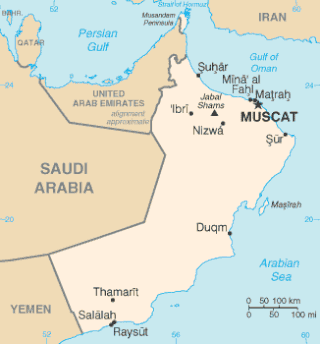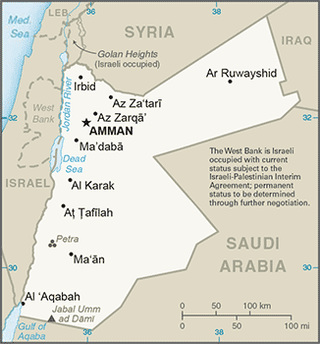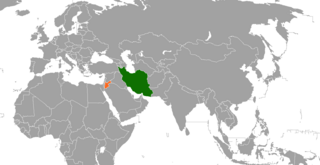

The History of Jews in Qatar is relatively limited, as unlike the neighboring countries in the Gulf of Persia, there is no documented settlement of Jews in the area now known as Qatar.


The History of Jews in Qatar is relatively limited, as unlike the neighboring countries in the Gulf of Persia, there is no documented settlement of Jews in the area now known as Qatar.
As an indication of the opening up of Qatari society to western influence and giving appropriate attention to the Jewish population, the Jewish Telegraphic Agency reported that a forum on U.S.-Islamic relations in Qatar would feature both Israeli and U.S. Jewish participants. Former President Clinton and Sheikh Hamad Bin Khalifa Al-Thani, the emir of Qatar, were the scheduled keynote speakers at the 2004 US-Islamic Forum in Doha. The forum was sponsored by the Project on US Policy Towards the Islamic World and funded by the Saban Center, founded by American-Israeli entertainment mogul Haim Saban. Participants came from predominantly Islamic countries, including Syria, Saudi Arabia, and Sudan. Martin Kramer, the editor of the Middle East Quarterly, was the sole Israeli participant since Saban and attended as an American. [1]
A news report that described the preparations for U.S. troops stationed in Qatar:
The Jewish members of America's armed forces will again receive kosher K-rations this Pesach throughout the holiday, provided by the U.S. Defense Department.
Thousands of packages containing kosher for Pesach MREs (meals ready to eat) have already reached U.S. army and navy supply bases, with special shipments aimed at Jewish troops in Iraq and Afghanistan...
The Jewish Chaplains Council estimates that the number of Jews stationed in Iraq is between 500 and 600. Of the 30 Jewish chaplains on active duty worldwide, eight chaplains are stationed in Iraq, including two female rabbis.
Each chaplain stationed in Iraq will hold two seders at base camps, with central seders in Baghdad, Falluja, and Tikrit. There will also be two seders at the army headquarters in Bahrain, and air force headquarters in Qatar. Jewish soldiers stationed in remote locations will be able to attend seders led by soldiers who received special training for that purpose. [2]
In 2007 a report stated,
Arab states, led by Saudi Arabia, are making some of their most public overtures ever to Israel and American Jews to undercut Iran's growing influence, contain violence in Iraq and Lebanon and push for a Palestinian solution...Saudi Arabia, Qatar, and the United Arab Emirates have stepped up contacts with Israel and pro-Israel Jewish groups in the USA. The outreach has the Bush administration's blessing: Secretary of State Condoleezza Rice has said six Persian Gulf states and Egypt, Jordan, and Israel are a new alignment of moderates to oppose extremists backed by Iran and Syria. She has said an Israeli-Palestinian peace deal would weaken militants such as Hamas and Hezbollah...Saudi and Gulf Arab contacts with Israelis and American Jews go back more than a decade but have never been so public. Arab countries have treated Israel as a pariah since it gained independence in 1948. Most Arab countries ban travel to Israel, investment there, and other commercial ties with the Jewish state and routinely refer to it as the "Zionist entity." ...Among the other recent Arab-Jewish contacts: Saudi national security adviser Bandar bin Sultan met privately with Israeli Prime Minister Ehud Olmert in Jordan in September, said Daniel Ayalon, Israel's former ambassador to Washington. He said it was the highest-level Saudi-Israeli meeting he'd ever heard of. The United Arab Emirates has invited a delegation from the Conference of Presidents of Major American Jewish Organizations. The conference, a 51-member umbrella group, is a strong supporter of Israel. Israeli Deputy Prime Minister Shimon Peres met the emir of Qatar in late January after taking part in a debate with Arab students there. It was the highest-level Israeli meeting with the Persian Gulf nation since 1996 when Peres visited as prime minister." [3]

The Middle East is a geopolitical region encompassing the Arabian Peninsula, the Levant, Turkey, Egypt, Iran, and Iraq. The term came into widespread usage as a replacement of the term Near East beginning in the early 20th century. The term "Middle East" has led to some confusion over its changing definitions, and being seen as too Eurocentric. The region includes the vast majority of the territories included in the closely associated definition of West Asia, but without the South Caucasus, and additionally includes all of Egypt and all of Turkey.

The Arabian Peninsula, or Arabia, is a peninsula in West Asia, situated northeast of Africa on the Arabian Plate. At 3,237,500 km2 (1,250,000 sq mi), the Arabian Peninsula is the largest peninsula in the world.

The Cooperation Council for the Arab States of the Gulf, also known as the Gulf Cooperation Council, is a regional, intergovernmental, political, and economic union comprising Bahrain, Kuwait, Oman, Qatar, Saudi Arabia, and the United Arab Emirates. The council's main headquarters is located in Riyadh, the capital of Saudi Arabia. The Charter of the GCC was signed on 25 May 1981, formally establishing the institution.

West Asia, also called Western Asia or Southwest Asia, is the westernmost region of Asia, as defined by some academics, UN bodies and other institutions, and includes Anatolia, the Arabian Peninsula, Iran, Mesopotamia, the Armenian Highlands, the Levant, the island of Cyprus, the Sinai Peninsula, and the southern part of the Caucasus Region (Transcaucasia). The region is separated from Africa by the Isthmus of Suez in Egypt, and separated from Europe by the waterways of the Turkish Straits and the watershed of the Greater Caucasus. Central Asia lies to its northeast, while South Asia lies to its east. Twelve seas surround the region (clockwise): the Aegean Sea, the Sea of Marmara, the Black Sea, the Caspian Sea, the Persian Gulf, the Gulf of Oman, the Arabian Sea, the Gulf of Aden, the Red Sea, the Gulf of Aqaba, the Gulf of Suez, and the Mediterranean Sea. The area contains the vast majority of the similarly defined Middle East, but excluding most of Egypt and the northwestern part of Turkey, and including the southern part of the Caucasus.

The Middle East, also known as the Near East, is home to one of the Cradles of Civilization and has seen many of the world's oldest cultures and civilizations. The region's history started from the earliest human settlements and continues through several major pre- and post-Islamic Empires to today's nation-states of the Middle East.

The Middle East and North Africa is a geographic region whose countries are often referred to by the acronym MENA. It is also known as WANA, SWANA, or NAWA, which alternatively refers to the Middle East as West Asia or as Southwest Asia; this is another way to reference the geographical region, instead of using the more common political terminology.

The Arab states of the Persian Gulf refers to a group of Arab states which border the Persian Gulf. There are seven member states of the Arab League in the region: Bahrain, Kuwait, Iraq, Oman, Qatar, Saudi Arabia, and the United Arab Emirates. Yemen is bound to the six countries of the Gulf Cooperation Council, based on history and culture.

Arab League–Iran relations refer to the political, economic, and cultural ties between the League of Arab States and the Islamic Republic of Iran. The former is a regional organization composed of 22 Arab states in MENA with a combined majority of Sunni Muslims, whereas the latter is a country in Western Asia with a majority of Shia Muslims.

There was a Jewish presence in Oman for many centuries, however, the Jewish community of the country is no longer in existence.

The history of Jews in Jordan can be traced back to Biblical times. Presently, there are no legal restrictions on Jews in Jordan, and they are permitted to own property and conduct business in the country, but in 2006 there were reported to be no Jewish citizens of Jordan, nor any synagogues or other Jewish institutions.
The history of the Jews in the United Arab Emirates describes the historical and modern presence of Jews over the millennia in the Middle East and the recorded meetings with Jewish communities in areas that are today in the geographic territories of the United Arab Emirates.

The history of the Jews in the Arabian Peninsula dates back to Biblical times. The Arabian Peninsula is defined as including the present-day countries of Bahrain, Kuwait, Oman, Qatar, Saudi Arabia, United Arab Emirates and Yemen politically and parts of Iraq and Jordan geographically.

The 1964 Arab League summit in Alexandria was held on 11 September 1964 in Montaza Palace, Alexandria as the second Arab League Summit. The focus of the conference was to implement the plans discussed at the first Arab League summit held in January of that year. The summit was notable for being a key step in the buildup to the Six-Day War in 1967 and separately for "approving the establishment of the Palestine Liberation Organization."

Iran and Saudi Arabia are engaged in an ongoing struggle for influence in the Middle East and other regions of the Muslim world. The two countries have provided varying degrees of support to opposing sides in nearby conflicts, including the civil wars in Syria and Yemen; and disputes in Bahrain, Lebanon, Qatar, and Iraq. It also extends to disputes or broader competition in other countries globally including in West, North and East Africa, South, Central, Southeast Asia, the Balkans, and the Caucasus.

Iran–Qatar relations refer to the bilateral relations between the Islamic Republic of Iran and the State of Qatar. Iran has an embassy in Doha while Qatar has an embassy in Tehran. Qatar and Iran have close ties.

Saudi Arabia–Qatar relations refers to the current and historical relationship between the Kingdom of Saudi Arabia and the State of Qatar. Prior to 2017, the two countries maintained cordial ties. Qatar was mainly subservient to Saudi Arabia in matters relating to foreign policy. Hamad bin Khalifa Al Thani's assumption of power saw Qatar reclaim its sovereignty in foreign affairs, often diverging from Saudi Arabia on many geopolitical issues. In 1996, the Qatari government launched Al Jazeera in a bid to consolidate soft power. One of the most watched news stations in the Arab world, Al Jazeera proved to be a wedge in the two's bilateral relations as it routinely criticized Saudi Arabia's ruler. The network also provided a platform for Islamist groups which are considered a threat to Saudi Arabia's monarchy.

The Qatar–Saudi Arabia diplomatic conflict refers to the ongoing struggle for regional influence between Qatar and the Kingdom of Saudi Arabia (KSA), both of which are members of the Gulf Cooperation Council (GCC). It is sometimes called the New Arab Cold War. Bilateral relations are especially strained since the beginning of the Arab Spring, that left a power vacuum both states sought to fill, with Qatar being supportive of the revolutionary wave and Saudi Arabia opposing it. Both states are allies of the United States, and have avoided direct conflict with one another.

Islamic Republic of Iran and Hashemite Kingdom of Jordan share a long but complicated relationship which has, at times, been tense and unstable. Jordan has an embassy in Tehran.

Levi Duchman is the first resident chief rabbi of the United Arab Emirates. He also serves as the head of the Jewish congregation of Abu Dhabi, of the Jewish Community Center of UAE in Dubai, and as a member of the executive board of the Alliance of Rabbis in Islamic States.

Mashriqi Jews refers to Jews from the Arab Mashriq region that covers parts of North Africa and Western Asia. This would include the following: